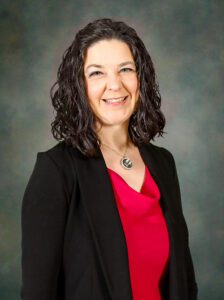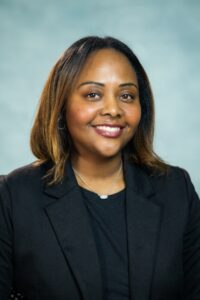State Department Representative Candidates

Katherine Goyette
Computer Science Coordinator
California Department of Education
Every K-12 student deserves the right to engage in high-quality, equitable computer science education. While this belief is foundational to my philosophy, I experience and witness challenges teachers face in advocating for building CS opportunities, particularly in schools serving marginalized communities, populations we prioritized in a statewide CS PD grant. I seek to give back to CSTA, to serve on the board to support educators in building capacity to engage all students with CS. I plan to further CSTA’s mission by communicating the necessity of universal CS opportunities to actively address inequities in the tech sector, expanding awareness of membership benefits, promoting professional learning and fostering inclusive communities that empower educators to increase CS opportunities.
As a writer working with the California Standards Advisory Committee for our state’s Computer Science Standards in 2018, I sought diverse perspectives to inform content development and gained skills in communicating the need for computer science for all K-12 students. In my current role as CS Coordinator at California Department of Education, I conduct empathy interviews and support county leaders in contextualizing statewide support to meet their local needs. CSTA’s chapter leaders serve a similarly valuable role in supporting members. As co-chair for CSforCA, I see benefits in grassroots advocacy, family engagement initiatives, and cohesion within the state, and collaboration with other states through organizations such as ECEP (Expanding Computing Education Pathways).
While California is home to Silicon Valley, CS instruction is not present in all areas of our diverse state. As CS Coordinator at California Department of Education, I analyze CS course code data to identify areas of inequitable access. In working with these underserved areas, local teams build upon their strengths. Central Valley schools may integrate CS standards into agriculture pathways while Southern California districts leverage partnerships with the entertainment industry. In schools with scheduling and resource challenges, integrating CS standards into mandated content areas has been a first step. While the approach begins at the local level, learnings are spread statewide. We need all students in CS. Communities can guide us to a pathway that works best for local context.
I have been a member of CSTA for nearly a decade and worked with local educators to found the CSTA California Central Valley chapter, to build a supportive community for CS educators in our area. I have participated in several CSTA professional learning sessions and have presented at the CSTA conference, sharing learnings on integrating CS across content areas, to increase access, particularly for underrepresented populations. As a chapter leader, I joined other CSTA leaders in California to facilitate conversations during a statewide community of practice hosted by CSTA. More recently, I joined the CSTA standards revision process as an advisor. I look forward to continuing to support CSTA as an active member and leader.

Sean Jackson
Program Manager
Department of Education, Commonwealth of Kentucky
I am honored to be nominated as the State Department Representative on the CSTA Board of Directors. This recognition reflects my leadership in CS education, and I’m grateful to serve CSTA in a greater capacity. As a Board member, I would continue my journey from uncertified CS teacher to Kentucky’s K-12 CS State Lead, advocating for universal access to high-quality CS education. I will collaborate on prioritizing comprehensive teacher training, exploring innovative professional development models, and promoting policies valuing teaching expertise alongside content knowledge. I’m committed to ensuring inclusive on-ramps for all students, promoting strategies for diverse learners, addressing entry barriers, and creating welcoming environments for students of all backgrounds. I will advance high-quality CS education standards, participating in curriculum framework discussions and ensuring CS education remains rigorous and relevant for future success.
Rather than presenting a full CV, I’ll highlight experiences that showcase my journey to state CS leadership. These experiences demonstrate that vibrant CS communities can be built in any school with the right student program, teacher passion, and emphasis on persistent excellence.
Instructional:
- History Teacher (2005-2015)
- School 1:1 Device Program Manager (2012-2020)
- CS Teacher (2015-2020)
- District CIO (2017-2020)
- Code.org Facilitator (2016-2020)
- Adjunct Instructor: Instructional Design and Project Management (2018-Present)
State/National/International:
- AP CSP Reader/Table Leader (2017-Present)
- Kentucky CS Standards Writer (2017-2018)
- Kentucky Technology Standards Oversight Committee (2018-2019)
- Kentucky K-12 CS State Lead (2020-Present)
- TeachAI Government Agency Advisor
- CSTA Participant: Reimagining CS Pathways, AI Priorities
- CSTA Standards Advisor
Other:
- ECEP Alliance State Co-Lead
- TechTrends Editorial Board/Reviewer
- AECT Leadership Roles
My route to teaching CS was different. As a High School History teacher, I began assisting with district technology initiatives simply because I was too young to be apprehensive. I discovered my passion for technology – figuring out how it worked, building applications, and understanding how social factors influence technology systems. I saw we weren’t allowing students to find that passion in formal CS classrooms. Having never taken CS in high school, I didn’t want my students to wait until they were 33 to discover it. As a non-traditional CS teacher, my struggle to get certified is the best experience I can provide CSTA. I advocate for various certification paths, emphasizing that certification only gives permission to teach; continuous upskilling makes it relevant. My state lead position is an excellent platform to ensure all students have access. I hope my enthusiasm and passion will benefit the CSTA Board.
As an engaged member of the state CSTA chapter and a dedicated representative from the state agency, my commitment to advancing computer science education is evident through my active participation in key CSTA initiatives. This includes contributing to the vital discussions at the CSTA Reimagining CS Pathways Convening in 2024, lending my expertise to shape the future of CS education pathways. My involvement continued into 2025 as a participant in the CSTA AI Priorities discussions, recognizing the critical importance of artificial intelligence in the evolving CS landscape. Furthermore, I currently serve as a CSTA Standards Advisor, where I directly contribute to the ongoing development and refinement of high-quality computer science education standards that will impact educators and students nationwide.

Lavita Williams
Computer Science Program Lead
Georgia Department of Eduation
I am passionate about advancing CS education and believe that serving on the CSTA Board will allow me to contribute to the future of CS instruction across the country. With 20 years of experience in education, serving in capacities as a CS teacher, curriculum writer, and state program manager, I possess a wealth of knowledge and a strong commitment to ensuring that all students, regardless of their background, have access to high-quality CS education.
I am dedicated to advocating for equitable opportunities, promoting teacher professional development, and supporting the integration of innovative technologies in classrooms. This aligns with CSTA’s efforts to create diverse, inclusive, and impactful computer science education experiences. I aspire to use my voice to influence policy, elevate best practices, and collaborate with educators nationwide to drive systemic change.
Classroom (K-12): Beyond the classroom, I served as a professional development facilitator for Code.org for four years and was a member of the writing team for the CS A curriculum at Code.org. Additionally, I have been a member of the local CSTA chapter for three years.
State/National/International: State Computer Science Program manager, policy implementation, advocacy, curriculum development, resource development, teacher community support, Reimagining Pathways project contributor, CS4GA collective impact backbone leader.
Skills: Previous CTAE and charter school advisory board experience, strategic planning, curriculum & standards development, stakeholder engagement & networking, professional development & advocacy, public speaking & thought leadership
As the CS Program Lead at the GA Dept of Ed, I am deeply committed to expanding equitable access to high-quality computing education. My work focuses on dismantling barriers for underrepresented students, ensuring they have resources, opportunities, and support to succeed in computing fields. Through the CS4GA Summit, CS Con, AI4GA project, and Day of Code, I’ve helped shape inclusive policies, guaranteeing all students have pathways into CS regardless of background. I’ve developed courses like CS for Counselors and CS for Admins to equip stakeholders with knowledge to support students. My leadership enables collaboration with educators, industry leaders, and policymakers to address participation gaps and elevate equity conversations, emphasizing diversity, accessibility, and culturally responsive instruction. I believe representation matters—students need to see themselves in computing careers.
I have been involved with the CSTA Georgia chapter for the past three years. During this time, I have attended and supported various events and participated in the “Reimagining Computer Science Pathways” project, where I contributed to the development of initial standards. Additionally, I have attended CSTA online meetings and engaged in social events organized by the Black Affinity Group. I have attended CSTA conferences and will be presenting at CSTA this summer.
